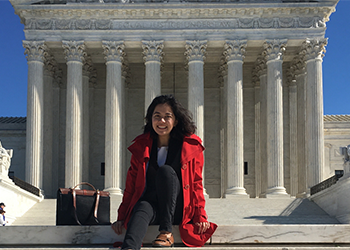Meet some of our politics majors.
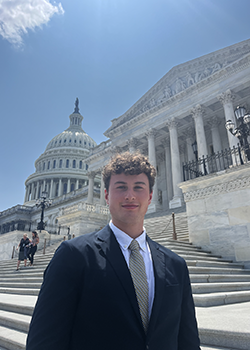
James Steinberger
Hometown: Hockessin, DE
Major: politics
What was your motivation to major in politics?
The 2016 election was my political awakening. I was still quite young, but I followed the election very closely, and had lots of discussions about it with my parents and others. I realized that politics determines almost everything of consequence in our world: war and peace, the distribution of wealth and resources, public health, climate change. I was fascinated by campaigns and by the mechanics of governing, and over time, it occurred to me that understanding politics—how political power is acquired and wielded—is essential knowledge and a prerequisite to social change. The 2016 election demonstrated the vulnerability of our democracy, something that I came to understand even more deeply just prior to matriculating to Oxy, when I served as an intern with Students for Voting Justice, a non-profit combating voter suppression in the South. I realized that we were in an existential fight for our democracy, and I ultimately decided to major in politics because I want to be part of that fight.
Every professor I have had in the politics department has been excellent. They have all been superb teachers and mentors who are completely invested in the success of their students.
Can you describe your working relationships with politics professors?
One of the reasons I chose Oxy was because of the small class sizes and the opportunity to form meaningful relationships with faculty. Every professor I have had in the politics department has been excellent. They have all been superb teachers and mentors who are completely invested in the success of their students. Last semester, for instance, I took Research Methods in Politics and Public Policy with Professor Elizabeth Wiener. Not only was she willing to see students outside of her normally scheduled office hours, but she even spent an entire Saturday on campus to help us with our final research projects. In the politics department, that kind of dedication is the norm.
In addition to my great experience in Research Methods, I have particularly enjoyed taking classes that explore the politics of other countries. As our world becomes ever more globalized and other nations vie for global hegemony, it is critical to understand the motivation and actions of other states. A course that did a phenomenal job of this was Contemporary Chinese Politics with Professor Tsung Chi, which helped me to understand how China’s complex and turbulent past has shaped its current political culture and ambitions. I likewise came away so much more knowledgeable about international affairs thanks to Professor Mariano Bertucci’s class, What Countries Want and Why. We are living through a period of global upheaval, and Prof. Bertucci underscored the importance of trying to understand, in a nuanced way, what motivates the actions of, say, a Putin or a Xi.
I have become so much better at dissecting nuanced issues and forming persuasive arguments; skills that will serve me well not only as a lawyer but throughout my life, as well.
What are your ambitions post-Oxy and how has the liberal arts approach helped to shape these ambitions?
After graduating from Oxy, I intend to pursue a law degree. I am passionate about social justice and bringing the reality of America more in line with the promise of America, and it has become clear as a politics major that the legal sphere is the best way I can do that. After working as a lawyer, I eventually want to use my legal background to transition to another industry, such as government, with the ultimate goal of being elected to Congress. I think this is the beauty of the law; the skills and mindset required to succeed transcend the legal field and are universally applicable. The liberal arts approach to education has played a significant role in shaping these ambitions. Taking classes across multiple disciplines is meant to foster intellectual curiosity and critical thinking skills, and this has certainly been the case for me at Oxy. Engaging with a diverse range of disciplines, from Urban and Environmental Policy to Diplomacy and World Affairs, has not only deepened my understanding of the societal structures and human behaviors that underpin legal issues but has also honed my ability to approach problems from multiple angles. I have become so much better at dissecting nuanced issues and forming persuasive arguments; skills that will serve me well not only as a lawyer but throughout my life, as well.
Do you have any advice for a student considering a major in politics?
My first piece of advice is to be informed—to have a solid grasp of American and international politics. Professors in the department want and expect students to keep up with the news and to know what’s happening in the world, and politics majors tend to be very knowledgeable about current events, which makes for really good classroom discussions. Another piece of advice is to take advantage of classes outside of the major. I have really benefited from taking courses in other disciplines. This past semester, I was able to take Introduction to Public Health and learn about resistance to government intervention in the lives of the citizenry simultaneously with Introduction to Political Theory, where I learned about the genesis of various theories about government involvement in public life. Taking these classes at the same time allowed me to draw throughlines between ostensibly distinct subject matters, allowing for a more nuanced understanding of contemporary issues. Lastly, politics majors tend to be very passionate and enthusiastic; if you are considering majoring in politics, talk to us—we are happy to share our insights about the department.
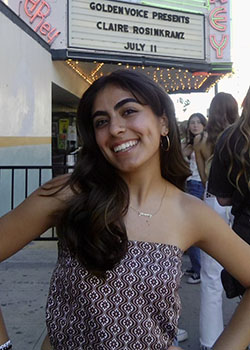
Jazzy Chhabria
Hometown: Irvine, CA
Majors: politics, economics; minor: cognitive science
Can you describe your working relationships with politics professors?
Because classes at Occidental rarely exceed 25 students, we have a unique and amazing opportunity to build one-on-one relationships with our professors. Undoubtedly, one of the coolest aspects of our school is that, by the second week of classes, essentially every single one of your professors knows your name and sees you as an individual in the classroom, as opposed to one of many in a lecture hall. Due to this, I have built close relationships with most of my politics professors, since visiting them during office hours with a question about a lecture or confusion on an essay often results in some discussion about my plans going forward, what I find compelling about the class, or my thoughts on current world discussions. My favorite politics class thus far is Who Wins and Why? Electoral Systems in Comparative Perspective, taught by my now-adviser Professor Isaac Hale. It was fascinating to dive deeper into how elections work around the world and the different reforms being tossed around to fix an extremely complicated and often messy set of challenges.
By the second week of classes, essentially every single one of your professors knows your name and sees you as an individual in the classroom, as opposed to one of many in a lecture hall.
What do you find most compelling about studying politics?
I find the intersections between politics and my other major, economics, incredibly compelling. The social sciences all study people, the patterns of their actions, and the reasoning behind these actions, but each from different perspectives and aspects of the human experience. Boiling it down, politics looks at how people interact with power while economics explores how people grapple with wealth. My favorite moments are when we talk about dynamics relating to wealth structures in my politics classes and discuss governmental economic policy measures in my politics classes. The two majors tie together really well and have enhanced my perspective on the world around me. Furthermore, I enjoy the tangibility and applicability of the content in my politics classes. The skills and knowledge developed in politics classes can be applied to other classes, higher education, or in the workplace. I like how much we draw on examples and history in examining human behavior and determining how these patterns can help improve imperfect structures and institutions. Finally, it’s really cool that oftentimes what we discuss in the classroom is happening somewhere in the world, and by making these connections to current affairs, my literacy and consumption of the news have improved!
What are your ambitions post-Oxy and how has the liberal arts approach helped to shape these ambitions?
Upon receiving my degree from Oxy, I plan to attend law school and get my J.D. I want to be an attorney who uplifts marginalized voices and uses the legal system as a vehicle for social change. Following my tenure as an attorney, I would hope to transition into a career in politics, either on the government or campaign side, but ideally as a specialist in economic or advocacy policy. The liberal arts approach has been critical to not only shaping these ambitions but also building the intellectual foundation to set me up for success in my goals. Firstly, though I already came into Oxy wanting to be an attorney, my time here has helped me confirm and refine that goal and understand the spectrums of politics that exist beyond campaigns and leaders—such as research and election systems. Moreover, every politics class I have taken has helped me hone my reading, writing, critical thinking, research, and argumentation skills. These abilities are essential to law school and my career goals, and all are a result of constant practice and the feedback I receive from my professors. For instance, I worked as an Undergraduate Legal Intern at the Public Defender’s Office last summer, and the politics classes I had taken leading up to that summer left me well-prepared to succeed in that position. Overall, the Occidental Department of Politics has evolved my thinking style and intellectual abilities to best prepare me for my postgraduate pursuits.
The liberal arts approach has been critical to not only shaping these ambitions but also building the intellectual foundation to set me up for success in my goals.
Do you have any advice for a student considering a major in politics?
My advice for a student studying politics would be to utilize the various opportunities unique to studying this discipline at a liberal arts college, and in particular at Oxy. If you’re interested in researching a topic you’ve always been curious about, reach out to a professor to see if they already have a project going that you can join or start your own with their help via the Undergraduate Research Center. If you are super intrigued by elections and campaigns, make sure to participate in Campaign Semester. If you’re a pre-law student like me interested in hands-on experience, explore the Community Law Internship 8-credit class. Opportunities that may seem normal to use are exceptionally unique and only possible because we are in LA—so take advantage of Oxy’s programs and apply them where your passions lie. Finally, I strongly encourage every politics major to build relationships—with peers, professors, and alumni. We have a large community of driven, passionate individuals, and building relationships with them can help you grow in so many ways that you wouldn’t otherwise be able to in a classroom.
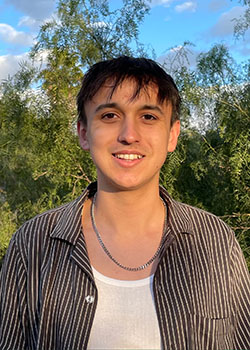
Eric Stump
Hometown: San Mateo, CA
Major: politics, minor: public health
What was your motivation to major in politics?
The first politics class I took at Oxy was called “Law and Society” with Professor Alec Arellano. Focusing on the Supreme Court and its most famous cases and outcomes, I feared the material would just be a rehash of the AP Government class I had just taken. Thankfully, the class was a riveting exploration of one of the more obscure branches of our government, but what really convinced me of the merits of the politics major was the final assignment for the class. After examining so many different court decisions and their ramifications, we had to design a policy memo that would improve one specific aspect of policing. The open-ended nature of the assignment really let students demonstrate their research skills and innovative ideas related to the topic, and gave us far more agency in designing our final policies than I expected. Almost every other class I’ve taken in the department has offered similar opportunities for open-ended research that lets students write about what actually interests them about politics.
Can you describe your working relationships with politics professors?
The politics department absolutely wouldn’t be the same without its extremely knowledgeable and passionate professors. Both in and out of the classroom they care about individual students and their advancement, and will provide you with all the resources you’ll need to succeed. Some of the best classes I’ve ever taken have been with the politics department at Oxy, particularly Black Political Thought with Professor Regina Freer and Research Methods with Professor Isaac Hale. These classes each challenged me to broaden my horizons as a student and a writer, and made me consider facets of political science equally as complex as they are important.
I find the intersection of theory and practice to be the most interesting part of politics. In order for any of us to produce meaningful change, we first have to understand why governments and individuals act the way they do.
What do you find most compelling about studying politics?
I find the intersection of theory and practice to be the most interesting part of politics. In order for any of us to produce meaningful change, we first have to understand why governments and individuals act the way they do. Both the theoretical and evidence-based aspects of politics can help us develop that kind of understanding, informing the movements that push for more equitable forms of government and economics. Politics is such a critical aspect of determining the form and function of nations across the world, so understanding the theory behind it has always been fascinating to me.
What are your ambitions post-Oxy and how has the liberal arts approach helped to shape these ambitions?
After Oxy, I plan to attend graduate school in order to get a master’s in Library and Information Science, something I never would have considered before attending classes here. The breadth of topics covered in Oxy classes, spanning 17th-century opera to neuroscience, has unearthed my passion for research and writing in a way that only a liberal arts education could. In addition, the politics department itself is structured in a way that ensures every student experiences the full range of topics encompassed within “politics”, which helped me learn just as much about the practical applications of laws as their theoretical underpinnings. I wouldn’t be the student I am today without the challenging and diverse coursework offered under the politics department at Oxy.
I wouldn’t be the student I am today without the challenging and diverse coursework offered under the politics department at Oxy.
Do you have any advice for a student considering a major in politics?
I would say to come into the major with an open mind. Many of the classes in the politics major will contest the viewpoints you already hold, and challenge you to back up your beliefs with well-formulated, evidence-based arguments. Don't let this scare you away though, as you'll undoubtedly come away from the major with the ability to view politics as the complicated and nuanced topic it actually is. I would absolutely recommend at least checking out an introductory-level class and seeing if the politics major is for you.
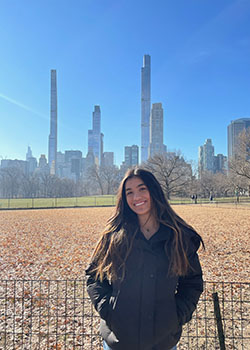
Rachel Aujero
Hometown: Fresno, CA
Major: politics, minor: religious studies
What was your motivation to major in politics?
I came to Oxy with uncertainty about what career I wanted to pursue. I explored several different departments on campus by taking introductory classes. It wasn’t until my spring semester, when I took Professor Elizabeth Weiner’s introductory American Politics and Public Policy, that I felt excited about a specific department. I grew up in a county with a different political viewpoint than most of my state, which originally motivated my interest in politics. In Professor Weiner’s class, we learned about the mechanisms that dictate how politicians pass policy and the why behind voter patterns and legislator behavior. Our final project was the truly inspiring moment when I knew that politics was the major for me. We were assigned to write a “puzzle paper” on a state that had policies or an election that puzzled us and to break down the make-up of its political system. This assignment gave me an “a-ha!” moment where I realized that there could be a deeper explanation for why people vote the way they do or how policies are dictated. It ignited my passion for academia and learning, and is leading me to explore a career in politics or law.
Can you describe your working relationships with politics professors?
The politics department would not be the extraordinary major it is without the faculty. The professors in our department are not only experts in their field, but they are the most helpful, encouraging, and grounded people I’ve had the pleasure of learning from and working with. There has not been a time where I’ve had a question/concern about a class topic or broader social issue that one of the professors has not taken the time to give me a thoughtful and well-researched answer. I’ve been lucky enough to learn from and work alongside Professor Wiener. I took her Research Methods in Politics and Public Policy and U.S. Public Policy classes. Both are highly rigorous and exposed me to aspects of politics that I was originally intimidated by while giving me a concrete understanding. Specifically, the Research Methods in Politics and Public Policy course taught me how to conduct quantitative research by gaining abilities in coding, literature reviews, and theory development. This course exposed me to the world of politics research, which I now want to pursue in my academic career. Professor Wiener not only challenged me, but encouraged my passions in politics and was incredibly helpful when I was navigating coding for the first time. Not only was I able to develop an understanding of carrying out quantitative research through coding, but I am now her preceptor for Research Methods in Politics and Public Policy.
The intersectionality of the department provides students with a holistic political education and can prepare them for numerous opportunities post-Oxy.
What do you find most compelling about studying politics?
As a politics major, you are required to study in the five subfields of the major. The department is an intersection of theory, comparative politics, research, public law, and international affairs. The intersectionality of the department provides students with a holistic political education and can prepare them for numerous opportunities post-Oxy. By studying politics, I’ve challenged myself in classes I love and worked alongside professors who support me.
What are your ambitions post-Oxy and how has the liberal arts approach helped to shape these ambitions?
Since joining the politics major, my sights for my future have shifted, and I am now set on pursuing a career in law. I’ve been able to take courses like Professor Alec Arellano’s Constitutional Law that gave me a sneak peak of what I can expect when I attend law school. I hope to pursue a career with an NGO, specifically writing legislation defending women’s rights and reproductive rights. I’m currently in my second year at Oxy and feel passionately about my future. However, that was not always the case. I came to Oxy with no idea what career I was going to pursue, so I was originally a STEM major thinking I would pursue medicine. The liberal arts approach, however, led me to explore all of my interests, like religious studies, history, and politics. I wouldn’t have been afforded the opportunity to truly explore my interest in politics if the liberal arts approach hadn’t encouraged me to look outside my intended academic focus. When I decided to study politics, I was confident in my decision because I had explored all other potential majors of interest.
I wouldn’t have been afforded the opportunity to truly explore my interest in politics if the liberal arts approach hadn’t encouraged me to look outside my intended academic focus.
What is the “vibe” of the politics department?
You aren’t just a student in the politics department. You aren’t just attending classes and taking notes. You’re being equipped with skills that will translate in your academic pursuits outside of politics and your future after Oxy. The “vibe” of the politics department directly reflects that because to the professors you aren’t just a face in their class. The professors have created a department that champions building community and forging relationships. I’m very grateful for the relationships I have formed with my professors, and I am equally grateful for the relationships I’ve developed with my fellow politics majors. Some of my closest friendships have been made through taking courses in the department and engaging with departmental events.
To see more Meet Our Majors profiles, visit the main page.

